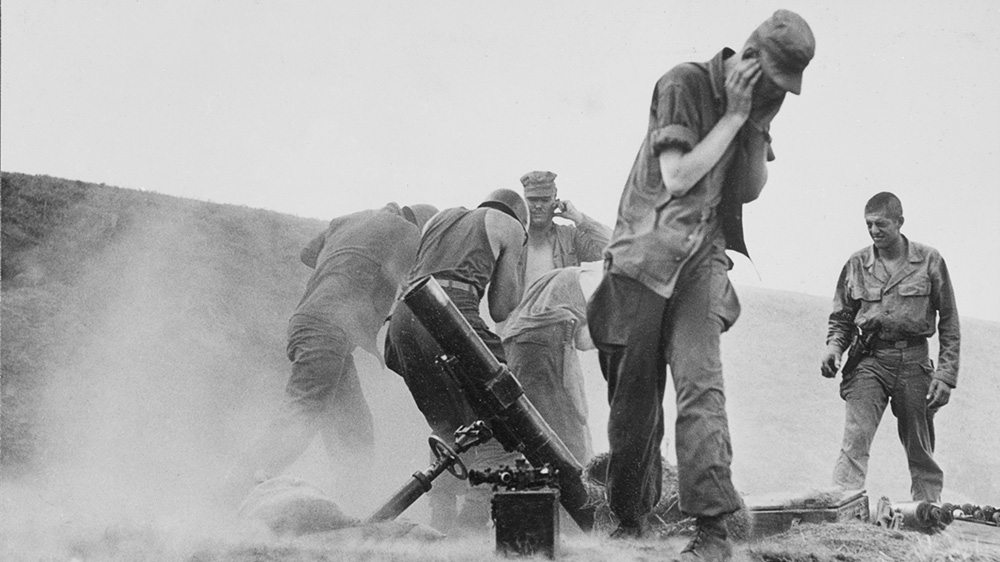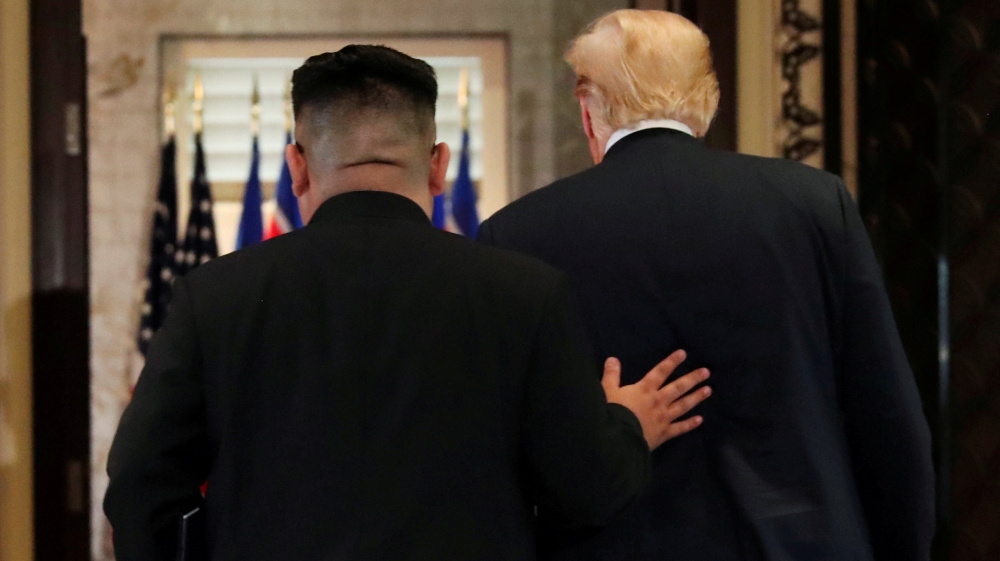In February 2018, Kim Yo Jong was the friendly face of North Korea, smiling and waving as she joined the crowds in South Korea at the Winter Olympics in Pyeongchang.
The two Koreas had entered the stadium together at the opening ceremony and fielded a joint women's ice hockey team. Kim was not only the first member of the North's ruling family to visit the South, but also shook President Moon Jae-in's hand. Relations were set to improve.
This month, however, it was Kim, the younger sister of the country's leader Kim Jong Un, who was repeatedly cited in bellicose warnings directed at South Korea, apparently over the leaflets floated across the border or along the river by defector groups, but really about the North's increasing frustration about Seoul's inability to deliver on cooperation promises or convince the United States to ease crippling economic sanctions.
The events were a "manufactured crisis", said Ramon Pacheco Pardo, a reader in international relations at King's College London and an expert on the two Korean Peninsula.
On Wednesday, the eve of the 70th anniversary of the start of the Korean War, state media reported that Kim Jong Un had instead decided to suspend the military actions his sister had threatened.
"North Korea feels that it hasn't received the concessions it was looking for from South Korea and the United States at the summits over the past few years," Pacheco Pardo told Al Jazeera. "The heightening of tensions is to signal displeasure at what has happened and that something different is needed."
State media reported, Kim's step back reflected an analysis of "prevailing conditions".
Uneasy truce
North and South have been stuck in an uneasy truce since 1953 when an armistice brought an end to the fighting in which millions of civilians had died and militaries on all sides had suffered heavy casualties. A peace treaty has never been formalised, and in recent decades, Pyongyang has lurched between engagement, isolation and the kind of headline-grabbing act exemplified by its decision to blow up the joint liaison office in Kaesong.
That move - a week after Pyongyang said it had severed all communication links with Seoul - effectively signalled the end of the Panmunjon Declaration and the latest round of engagement which had begun in 2018 under Moon.
It was "an attempt to make a clean break with the Moon administration," noted a commentary in 38 North, a website devoted to the analysis of North Korea from the Stimson Center in Washington, DC.
The heightened rhetoric followed a series of missile tests last year after the second summit between Kim and US President Donald Trump broke down over sanctions relief, and a later attempt to revive denuclearisation talks foundered. Kim had set a yearend deadline for the US to shift its stance.
In targeting Seoul, and dismissing Moon's offer of envoys, Pyongyang might have been hoping that the president, who has made inter-Korean cooperation a cornerstone of his administration, would lean on the US to ease some of the sanctions imposed as a result of the North's nuclear testing.
Instead, the South responded more forcefully than usual, saying that by criticising Moon, Kim had "fundamentally damaged the trust between the two leaders". The unification minister resigned.
Seoul priorities
Jay Song, an academic at the Asia Institute at the University of Melbourne, says the internal politics in the South also requires scrutiny, and notes that the Unification Ministry cannot do anything without a green light from the National Security Council in the presidential Blue House.
"The National Security Council are internationalists [and] prioritise the Republic of Korea-US alliance over the Unification Ministry's ethno-nationalist mandate on improving inter-Korean relations," said Song, who is the Korea Foundation senior lecturer in Korean Studies. "The choice for South Korea is not an easy one, especially when the North wants to be a nuclear state."
South Korea has struggled with how to deal with its northern neighbour since the end of Japanese colonisation led to the partition of the Korean Peninsula between the Soviet Union-backed North and the US-backed South.
Pyongyang, which has long dismissed Seoul as a "puppet" of the US, sent its troops across the 38th parallel on June 25, 1950, in a move that led to UN intervention, the mobilisation of US and Commonwealth forces, and brought in Chinese troops fighting in support of the North Koreans.
China was worried then, as it is now, about maintaining a buffer state, while the US continues to station some 28,500 troops in the South. The Demilitarised Zone (DMZ) between the two countries remains one of the world's most heavily-fortified frontiers, despite calming measures that were part of the 2018 agreement.
Under the deal, the two sides agreed to remove soldiers from some border areas, withdraw loudspeakers used to broadcast propaganda messages from North to South - moves Pyongyang this month said it would reverse - and curb the activities of defectors and activists floating balloons of propaganda leaflets from South to North.
Amid the escalation, South Korea again promised legal action to put an end to the leafleting, but the sanctions make it difficult for Moon to deliver on the economic initiatives envisaged in 2018 without the backing of the US.
Even before Kim's move to step back from provocations, analysts noted that while the posturing was helping Kim Yo Jong burnish her credentials for leadership in a patriarchal and militarised regime, the decision to map out its planned steps suggested some flexibility - an opportunity for her brother to "refrain from directly engaging in hostilities in order not to exhaust the chance that he could still meet with President Moon and President Trump to make a deal in the future", said Lami Kim, a professor of Asian Studies at the US Army War College.
"The wording of the announcement, certainly in Korean, makes clear that this is a temporary decision," KCL's Pacheco Pardo observed. "So the announcement leaves the door open for further de-escalation, but also for re-escalation."
Trump disappointment
After the heady days of the Singapore and Hanoi Summits, Trump now seems to have lost interest in North Korea, focused instead on shoring up his own position in a bruising battle for re-election in November amid the world's worst coronavirus outbreak and public anger over police brutality and systemic racism.
Even during the Singapore summit, if former national security adviser John Bolton is to be believed, Trump's focus was merely on the optics, wanting to know how many journalists were expected to attend the final news conference.
"That's what he was focused on," Bolton said in an interview with ABC News on Sunday. "That he had this enormous photo opportunity - first time an American president has met with the leader of North Korea."
"Like many other countries around the world, North Korea has probably realised that this president is not going to deliver," said Pacheco Pardo. "But they don't want to completely break with the US."
China remains North Korea's biggest ally and satellite images shared by the Stimson Center suggest trade may have resumed at the border, after months of closure as a result of the coronavirus pandemic.
"The outbreak of COVID-19 suspended tourism and trade with China, taking the country's economy close to a breaking point," said the US Army War College's Kim. "It is still too early to give up on diplomacy, not because KJU is a trustworthy leader, but because the dire economic situation in North Korea make economic inducements highly appealing."
In Pyongyang, the regime feels it has made sufficient concessions - taking steps to destroy its nuclear facility in Yongbyon and returning the remains of soldiers who were killed during the war - to deserve some concessions.
Some 147 sets of remains arrived back in Seoul from Hawaii on Wednesday, some of which were discovered as a result of the 2018 initiative, but if the South had hoped the two-year-old detente was a sign that the cycle of provocation and engagement had been consigned to the past, the events of the past few weeks have shown there is still a long way to go.
World - Latest - Google News
June 25, 2020 at 07:35AM
https://ift.tt/2Bb2oAu
North Korea tests limits of diplomacy amid sanctions squeeze - Al Jazeera English
World - Latest - Google News
https://ift.tt/2SeTG7d
https://ift.tt/35oCZy1
Bagikan Berita Ini

















0 Response to "North Korea tests limits of diplomacy amid sanctions squeeze - Al Jazeera English"
Post a Comment